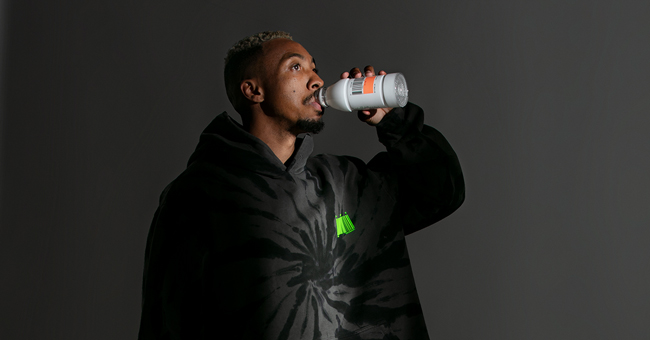Developed by a former New York Knicks trainer and backed by Los Angeles Lakers star Kyle Kuzma, Barcode is a new plant-based sports drink launching online this week.
What is Barcode?
Barcode promises “premium hydration” with electrolytes and B vitamins and no added sugars, but also added functional benefits thanks to ingredients like mushroom extracts and coconut water concentrate. The drinks come in two flavors: Watermelon and Lemon Lime, each in 16.9 oz. PET bottles.
The bottle packaging features a minimalist, tech-forward label design including a QR code that consumers can scan to activate an artificial reality experience and view additional content around the brand.
“I thought it would be really cool if you have a barcode on the label, and that scanning it (with phone) took you to places that could allow you to understand it from a content perspective and educational standpoint,” he said. “It makes for a more interactive community.”
Who’s behind Barcode?
The brand was created by Bar Malik, an experienced sports trainer and former head of player performance with the NBA’s New York Knicks. During his seven-year tenure with the team, he told BevNET, Malik immersed himself in methods of measuring athletic performance and how factors such as recovery time and sleep quality impact play on the court, while also advising sports nutrition companies such as LeBronJames’ Ladder Sports. He left the team last August to develop and launch Barcode.
Through his connections in the pro sports world, Malik has also brought athletes into the fold. After using the product during the team’s run to the NBA title last year, Los Angeles Lakers forward Kyle Kuzma signed on as a co-founder of Barcode, Malik said, while a “couple of NFL coaches” and other entertainers are also reportedly involved. Outside of investing in the brand, Malik said that the product has been extensively road tested by pro athletes during its development.
How does it fit in the sports drink category?
Though Gatorade still dominates the sports drink market, boundaries around the $7 billion-plus segment are less defined than in the past, thanks to the growth of adjacent categories with similar callouts: premium water, various plant-based waters and the host of rapid hydration powders that have emerged in recent years. In response, brands have been eager to supply consumers with functional innovations and versatile formats, such as BodyARMOR’s caffeinated Edge line, new zero-sugar releases from Vitaminwater, or ROAR Organic’s move into powders from RTDs. The overall shelf-stable water segment grew 8.2% over the past year?
As consumers seek beverages that offer some functional benefits, Malik sees an opportunity for Barcode to distinguish itself from the crowd by taking a holistic approach. The brand is structured to appeal to both pro athletes and sleep-tracking, step-counting civilian “high performers,” he said, but also the “recreational athlete who doesn’t want to spend a ton of money on these products but still wants to be well.”
“What has happened in the past from my experience is that a lot of companies drop the ball on just not understanding this 360 model of what drives performance,” he said, highlighting the presence of efficacious amounts of magnesium, vitamin D and vitamins B6 and B12. “You think differently about formulating and about how you scale and commercialize the product. [But] you don’t change the ingredients that you have for the elite athletes.”
For now, Barcode will be seeking those consumers out online: a 12-pack is priced at $48, or around $40 with a monthly subscription. Offline, Malik said the brand has several wholesale partnerships in place with gym affiliates, but will retain a minimal retail presence for at least the next six months, with formal launch not expected until 2022. Focusing on e-commerce will allow the brand to refine and improve the product, he added, though one change is already confirmed: by the time Barcode releases its third flavor, the line will be in aluminum bottles, Malik said.
The brand’s use of mushrooms could also be a jumping off point for future growth, according to Malik. That past year has featured mushrooms being integrated across a range of categories, including coffee, powdered creamers, sparkling water and even sports drinks via ex-NFL star Jerry Rice’s brand G.O.A.T. According to a report by Business Market Insights, the North American mushroom market is projected to reach $3.51 billion by 2027.
“I think it could be very easily positioned into beauty, into wellness, into skincare, because of the mushrooms that are in it,” he said. “A lot of these companies we can cross-collaborate because there’s a big push behind mushrooms and adaptogens right now: you have the Four Sigmatics, the Moon Juices, the Kins. We talked about over time evolving it to be into one of these other spaces, but the focus right now is to keep it a beverage and building a community from there.”

